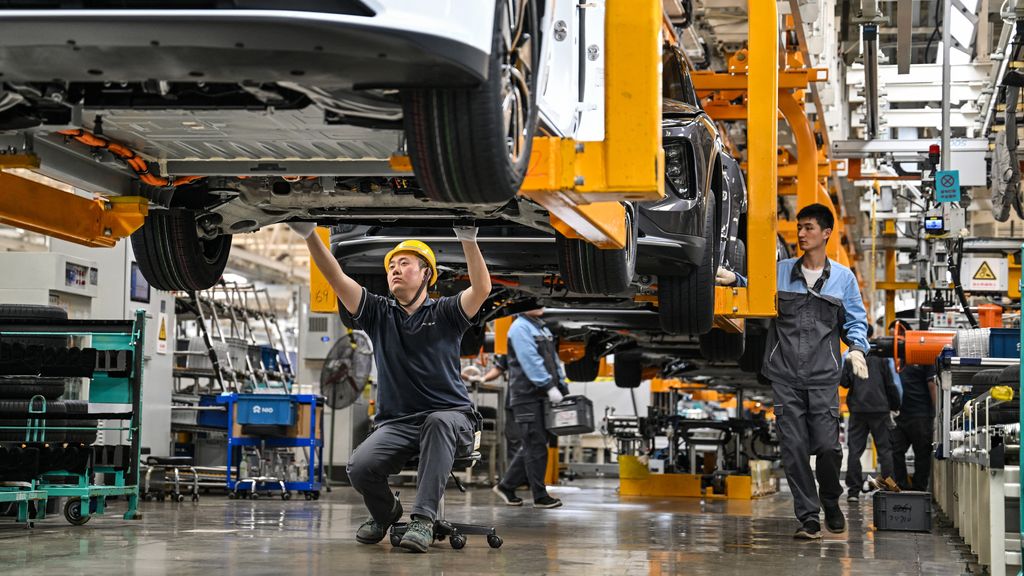Noos News•
-

Sjoerd den das
China Correspondent
-

Sjoerd den das
China Correspondent
Repeated lockdowns due to Corona may end, and factory halls will open again: Business as usual It is lowest for foreign companies in China. This comes as Beijing views everything and everyone outside the People’s Republic with suspicion. “On the one hand, the government says reform will happen and the red carpet has been rolled out,” says Jens Eskilund. “On the other hand, it is all about self-sufficiency and security.”
He is the President of the European Union Chamber of Commerce and the European Business Club of China. The 1,700 companies he represents are finding it increasingly difficult to obtain numbers, and increasingly difficult to obtain data they hold outside the country. “Businesses need reliable information. If it is not accessible, it will have an impact on the willingness of foreign companies to invest here.”
Economic figures have never been so transparent in China. “man made“And therefore unreliable, as former Premier Li Keqiang himself was said to have once pointed out. But in any case, the numbers provided a trend for developments in the People’s Republic. Since this summer, Beijing has no longer published figures on youth unemployment, only when Reached a record high Consumer confidence numbers have not been published for some time.
Beijing believes it is too sensitive, at a time when economic figures are increasingly classified as state secrets. State media have been instructed not to focus too much on the economic headwinds the country is facing; There is only room for “positive” comments from economists. Something the Lobby Club is also experiencing. “For example, many of our posts on WeChat, in which we share facts, have been deleted offline,” complains Eskelund.
Collect the information yourself
“As a company, you can go out on your own and still collect valuable information,” he said when asked how his members navigate a country where they increasingly have to find their way. “But the space allocated for that is shrinking.” Especially when it comes to conducting substantive research; Everything can be described as a state secret. “There are still companies that want to do this work, but the specific questions can be very sensitive in certain areas.”
For example, the combination of forced labor and Xinjiang, a region where Beijing has sent hundreds of thousands of Uyghurs and other Muslim minorities to re-education camps in recent years. In a report, the UN rapporteur on slavery said there was “reason to conclude” that minorities in the region were also forced to perform forced labour, including in the agricultural and manufacturing sectors.
China strongly denies this. But anyone who tries to independently investigate these allegations pays a heavy price. This spring, for example, the Beijing branch of US consulting firm Mintz was raided because it was reportedly helping other companies locate their suppliers in Xinjiang. Five employees were arrested.
This was followed by a raid on the office of the American company Bain & Company in Shanghai. Capvision also received a visit. Chinese state media described the raids as a counter-espionage operation on behalf of state security.
Meet European requirements
European companies operating in the services sector appear to have survived so far, but there are valid concerns. Self-censorship is latent. “Then it says, ‘We would love to help you, but please know that we would prefer not to serve you in these areas,’” Eskelund says.
This is something that the Vice President of the European Union Chamber of Commerce, Miguel Montoya, himself a partner in a major consulting firm, says he does not see immediately again. “There have not been any major problems so far, but uncertainty is of course increasing. Quality is not perfect in all cases.”
Foreign companies are thus trapped between the demands of the EU and consumers and the reality in China, which is fully committed to national security. While Brussels requires companies to prove they meet high standards in human rights and the environment, China closes the door on them.
“If you can’t find anyone who can do audits for you in China, you won’t be able to comply with European regulations,” warns Eskilund. “This may result in companies having to pack their bags and leave sensitive areas.”
In the annual Position paperthat the European Union Chamber of Commerce today publishedHe makes a thousand recommendations to Beijing.
“There was optimism in 2017 when the president said he was committed to market reforms,” Eskelund said, referring to President Xi Jinping’s speech at the World Economic Forum that year. Shortly after Trump took office, Xi Jinping seemed like a champion of free trade. “Companies want to invest here, but they are tired of promises and want to see action,” says Eskelund.
China is facing a major economic crisis due to a decline in consumer spending and a real estate market crisis:

The Chinese economy is in dire straits







